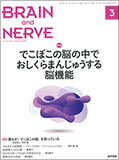Japanese
English
- 有料閲覧
- Abstract 文献概要
- 1ページ目 Look Inside
- 参考文献 Reference
腸内細菌はさまざまな疾患リスクになるが,認知症との関連は未解明であった。そこで,筆者の所属するもの忘れ外来の患者を対象に,認知機能検査,頭部MRIなどに加え採便検体を収集・腸内細菌を解析する観察研究を実施した。採便検体から細菌由来の混合DNAを抽出し細菌叢を網羅的に解析した。多変量解析の結果,腸内細菌は認知症と強く関連した。横断調査のため因果関係は未解明であるが,今後の研究展開が期待される。
Abstract
Dysregulation of the gut microbiome is associated with several life-threatening conditions, and might therefore represent a useful target for the prevention of dementia. However, the relationship between the gut microbiome and dementia has not yet been fully elucidated. Here, we recruited outpatients visiting our memory clinic to participate in this study. Information for patient demographics, various risk factors, and daily activities was collected, and cognitive function was assessed using neuropsychological tests and magnetic resonance imaging scans. Fecal samples were obtained, and the gut microbiome was assessed by terminal restriction fragment length polymorphism (T-RFLP) analysis, one of the most well-established and reliable 16S ribosomal RNA-based methods for classifying gut microbiota. Multivariable logistic regression models were used to identify factors independently associated with dementia and mild cognitive impairment. Graphical modelling was used to illustrate mutual associations. We analyzed 128 eligible patients (female: 59%, mean age: 74.2±8.7 years, mean Mini Mental State Examination score 24). Multivariable analyses showed that enterotype I and enterotype III bacteria were strongly associated with dementia, independent of traditional dementia biomarkers. Further studies investigating metabolites of gut microbes are needed to determine the mechanism underlying this association.

Copyright © 2020, Igaku-Shoin Ltd. All rights reserved.


